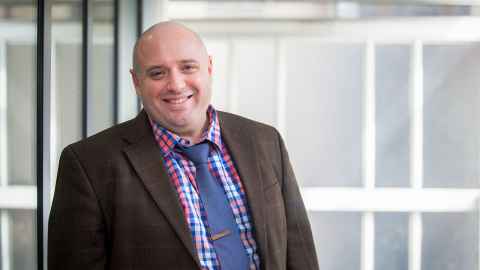Are we totally overwhelmed by digital media?
10 October 2018
Yes, in today's fast changing media environment, many of us are, says Dr Ethan Plaut, who teaches as part of our new Bachelor of Arts major in Communication.

Dr Plaut's research is focused on understanding how digital media impact us and how we can disconnect, looking at both historical and current examples.
"We have been brought up to believe more information is better information," he says. "But these ideas have been taken to new heights with digital technology and they put our emotional lives, and democracy, at risk."
"If we are awash in media all the time, struggling to keep up with the 24-hour news cycle, staring at screens day and night and can't get away from it, process it, make our own evaluations, own decisions, we lose touch with ourselves and each other."
"It's easier to be propagandised if we are constantly awash in more messages than we can critically process."
Dr Plaut says there is no more exhausting subject of academic inquiry right now than digital propaganda. "One can barely come up for breath. Not only is the propaganda itself being generated algorithmically at the speed of light, but research about it is also piling up."
He says our received ideas about propaganda usually come from the mid-20th century. "Media today are chaotic, and my thesis is that it's orchestrated, deliberate chaos. Why? Because if you can exhaust and confuse people, you deplete their attention, and lower any potential criticism or resistance to what you want to do. Propaganda is designed to short-circuit thinking, to prevent meaningful debate. And of course the flipside of all this information blasted at us, as propaganda, is all the information being sucked out — as surveillance."
The person who is answering emails all night is not necessarily the person with any power.
Dr Plaut has a PhD in Communication Research from Stanford, California as well as a Masters in Computer Science and is turning his doctoral research into a book.
"I love interviewing people but a lot of my work is done alone, too, in libraries and at the keyboard, picking apart both documents and devices. If we're going to ask hard questions about how new media 'work' not only in the technical sense, but also how our personal, social, and political lives are being transformed by it, using just one research method isn’t going to cut it."
He has studied the ways people go offline and find silence whether it's using tools such as purpose-designed software or physically going on vacation to places that are off the grid.
He also looks historically at what he calls "infrastructures of silence" — monks' vows of silence, lovers giving each other the silent treatment, people who abstain from voting and other forms of political communication.
"So much of the world's population has a cell phone that going off-line, being unavailable and having time to yourself, is becoming a luxury," he says. "The person who is answering emails all night is not necessarily the person with any power."
Media queries
Tess Redgrave | Media Adviser
Tel: 09 923 7383
Mob: 027 562 5868
Email: t.redgrave@auckland.ac.nz